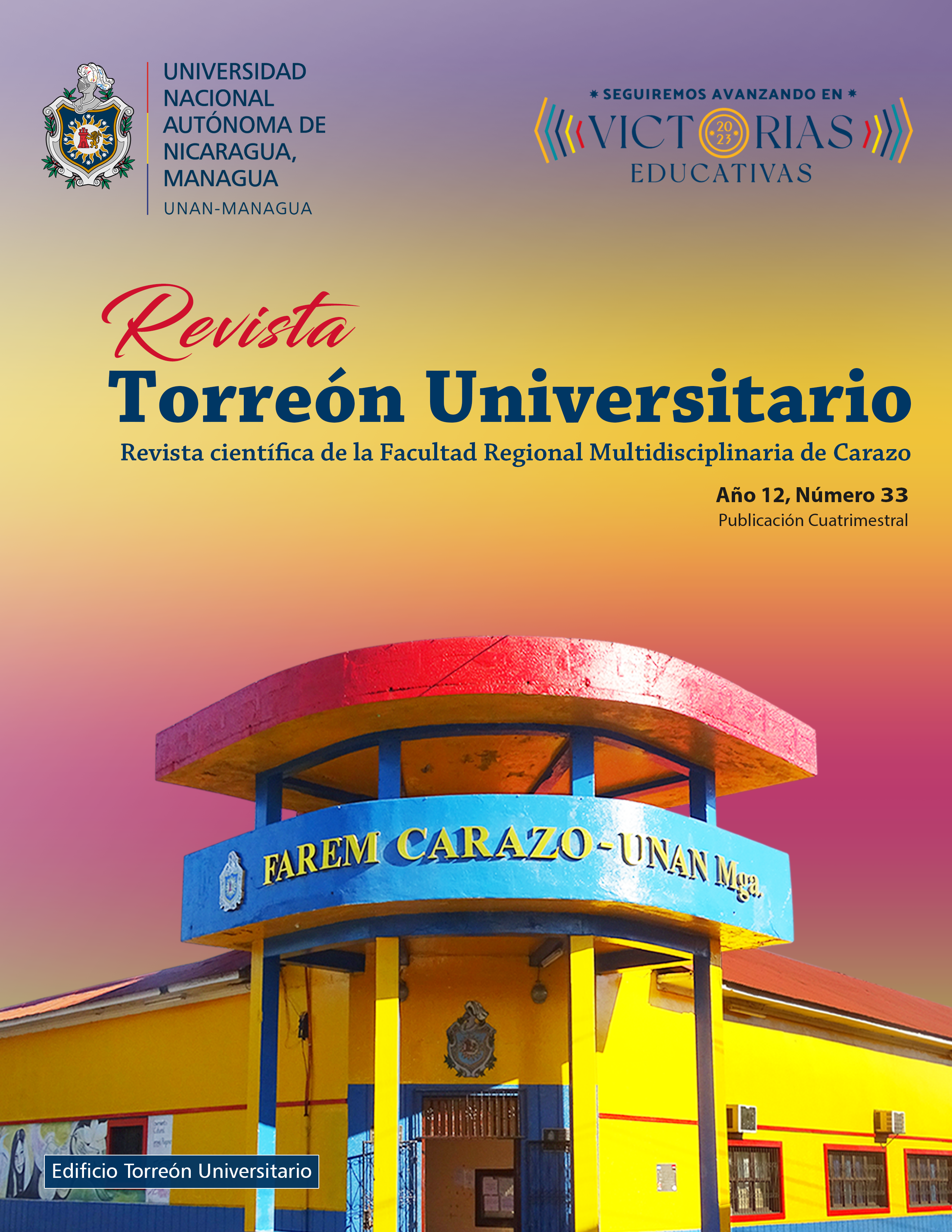The didactics of oral competence from the perspective of the schema learning model
DOI:
https://doi.org/10.5377/rtu.v12i33.15883Keywords:
earning, speech, scheme, methodology, modelAbstract
Oral communication represents for any human being an essential model of sociocultural interaction in diverse communicative contexts. Therefore, this article aims to present some considerations on the didactics of orality, specifically the formal oral discourse at the round table, from the perspective of the Schematic Learning Model. The study uses the qualitative approach for the structuring and analysis of the research instruments. Likewise, according to its typology, it is classified as Participatory Action Research (PAR). In relation to the results, those that indicate the conceptual and procedural advances of the learning situations (discourse, round table and logical connectors) are based on the three phases of information analysis (diagnostic, formative, consolidation). Regarding the discussion, progress is specified in stages and limitations are highlighted, highlighting those related to collaborative work, the construction of materials and the integration of ICT. On the other hand, the conclusions show the functionality of the adopted model due to the lexical insertion of 187 connectors to the discourse and 88% compliance with the round table methodology. Likewise, it is emphasized the need to continue the validation of the approach in didactics of language and literature considering the diversity of discursive typologies, the macro-skills of language and special education.
Downloads
References
Arias, S y Hernández, S. (2017). Estrategia Didáctica para la Enseñanza del Discurso en el Área de Lengua Castellana del Grado Once de la Institución Educativa Municipal Liceo Central de Nariño [ Tesis de licenciatura, Universidad de Santo Tomás] Repositorio Institucionalhttps://repository.usta.edu.co/bitstream/handle/11634/9505/AriasSandra2017.pdf?sequence=1
Balcazar, F. (2003). Investigación acción participativa (IAP): Aspectos conceptuales y dificultades de implementación. Fundamentación en Humanidades, 4 (8), 59-77. https://www.redalyc.org/pdf/184/18400804.pdf
Brenes, R. (2011). Desarrollo de la expresión oral y la comprensión auditiva como parte de las competencias comunicativas y desde el enfoque comunicativo, en estudiantes de educación diversificada de colegios públicos de Cartago en el 2009 [ Tesis de doctorado, Universidad Nacional Estatal a Distancia] Repositorio Institucional https://repositorio.uned.ac.cr/reuned/handle/120809/1004
Escobar, A. (2016). Esquemas de aprendizaje de la gramática [ Tesis doctoral, Universidad Nacional Autónoma de Nicaragua, Managua].
Granda, O. (2010). Estrategias didácticas para el trabajo del discurso oral en el aula: Octavo año de educación general básica [ Tesis de licenciatura, Universidad de Cuenca] Repositorio Institucional https://dspace.ucuenca.edu.ec/bitstream/123456789/2016/1/tle189.pdf
Hernández, S, Fernández, C y Baptista, P. (2014). Metodología de la investigación (6 ed.) Editorial Interamericana. http://observatorio.epacartagena.gov.co/wp-content/uploads/2017/08/metodologia-de-la-investigacion-sexta-edicion.compressed.pdf
O'shanahan, J. (1996). Enseñanza del lenguaje oral y las teorías implícitas del profesorado. Soportes Audiovisuales e informáticos [ Tesis doctoral, Universidad de la Laguna] Repositorio Institucional https://riull.ull.es/xmlui/bitstream/handle/915/10093/cs27.pdf?sequence=1&isAllowed=y
Quiles, M. (2015). El discurso oral en las aulas de educación primaria. Revista lenguaje
y textos, 9 (12), 77-87. https://ruc.udc.es/dspace/bitstream/handle/2183/8237/LYT_23_2005_art_7.pdf?sequence=1&isAllowed=y
Downloads
Published
Issue
Section
License
Copyright (c) 2023 National Autonomous University of Nicaragua

This work is licensed under a Creative Commons Attribution-NonCommercial-NoDerivatives 4.0 International License.
The authors who publish in this journal agree to the following terms.
- The author or authors of the articles, essays or research grant the National Autonomous University of Nicaragua, Managua (UNAN-Managua) the editing rights (copyright) of the submitted work, therefore the University has the exclusive right to publish the article for the entire copyright period.
- These copyrights/authors authorize Torreón Universitario Magazine and the University to edit and disseminate/publish the article in said Magazine, including printed and electronic reproduction, storage, retrieval and any other type of publication, and sources of secondary information as services. of summaries and databases, they also empower it to protect the article against unauthorized use for dissemination by printed or electronic media (PDF, HTML, EPUB, XML or others).
License for use of content
The magazine uses the Creative Commons Attribution-NonCommercial-NoDerivs 4.0 International License.
Under this statement:

This journal is licensed under a Creative Commons Attribution-NonCommercial-NoDerivatives 4.0 International License. It can be copied, distributed and transmitted publicly as long as the author and source are cited (Revista Torreón Universitario), it should not be modified or used for any commercial purpose. The full license can be found at http://creativecommons.org/licenses/by-nc-nd/4.0/.



